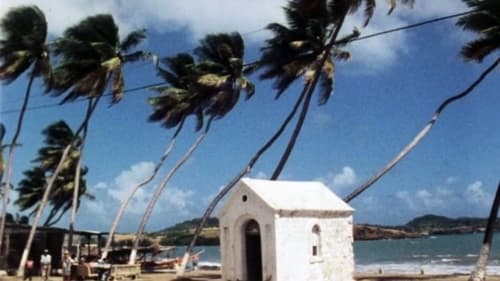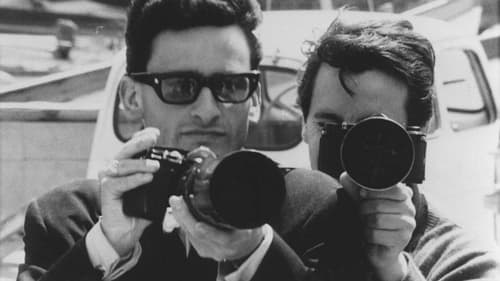
Director of Photography
In 1976-77, José Ma Berzosa contacted General Pinochet during a trip to Chilean Antarctica. On his return to Santiago, Pinochet agreed to be interviewed. In front of the camera, the General and three members of the junta speak about their memories and political thoughts, artistic tastes and their family lives. From the interviews, conducted in an apparently cordial atmosphere, emerges an ironic portrait without concessions of their taste for order, efficiency and a certain "ordinary fascism." By way of contrast, the families of victims and missing people endure a different reality

Director of Photography
Retratado por Jean-André Fieschi, Jean Rouch nos invita a compartir la filosofía que aprendió del pueblo de los Dogón: “Hacer como si...”. Esta invitación a la fabulación y al disfraz sirve de punto de partida al viaje que nos lleva hasta las orillas del río Níger, donde Rouch filma a sus amigos Damouré y Tallou en La vaca maravillosa, a partir de una idea del difunto Lam, a cuyo espectro pedirán permiso para realizar el film. Un bello retrato del etnógrafo-cineasta, padre del documental moderno, que aprendió a filmar la realidad mientras la inventaba con sus protagonistas.

Director of Photography
Documentary that tells the deepest story of Mexico today. The story of the Zapatista Army of National Liberation, that army of Mayan Indians that burst into our lives with the sound of the voices of women and men who emerged, on January 1, 1994, from the Lacandon jungle to tell the powerful enough is enough!

Director of Photography
A conversation between the director of this film, Carmen Castillo and Marcia Merino, AKA La Flaca Alejandra who was one of the collaborators of Pinochet's secret police (the DINA) after being tortured by them. It was Merino who betrayed Castillo, who lost her new born child after being tortured. Almost twenty years later, Carmen Castillo returns to Chile after her exile to film this documentary, during a time in which Marcia Merino, on the court of justice, decided to give the names of her old bosses who worked with her on the DINA.

Director of Photography
Un hombre vive en carne propia las contradicciones entre el desarrollo intensivo de EE.UU. y el subdesarrollo de México.

Camera Operator
Scarlatti en Sevilla, trabajo que forma parte de la serie Opus producida por Mildred Clary para el Instituto Nacional del Audiovisual francés donde una serie de intérpretes hablan de los músicos que interpretan y del porqué de su elección, salta, insinuando mucho a través del montaje paralelo, de la representación del oscuro palacio a una palmera acariciada por el viento en el Alcázar de Sevilla. Y desde allí poco más se hablará de Scarlatti, del que hasta su firma desconocemos, pero se oirá su música, mayoritariamente interpretada por el pianista alemán Christian Zacharias quien también hablará de su obsesión por la obra del compositor italiano.

Cinematography
In a small French village, Communist activist and poet Ovida Delect undergoes her social gender transition with the unbridled support of her wife Huguette. Meanwhile, the couple's teenage son harbors some serious reservations about Ovida's transition.

Director of Photography
"Hermann mein Vater" is a companion piece by director Helma Sanders-Brahms to her 1980 film "Germany Pale Mother". The latter work was focused on the impact of war on a German family. This made-for-tv documentary follows Sanders-Brahms and her father Hermann on a trip to Normandy, where he was stationed as a soldier in 1940-41.

Director of Photography
A sensitivity to sounds coming from the activities of an unwelcome guest in the close quarters of an apartment is only one important component in this atmospheric, avant-garde drollery by Chantal Akerman. When the apartment owner comes home, her guest is settled in and at first, the slightly reclusive host decides simply to eat her breakfast in her room instead of having to face morning conversation with her guest. Sounds of the toilet flushing, the bath water running and splashing, footsteps pacing, and furniture moving invade the hostess' refuge in her bedroom like the frontrunners of an all-out offensive. She locks herself up for 28 days, life's detritus accumulating around her, just so she does not have to go out to face the nemesis that lurks beyond her door.

Director of Photography
Chantal Akerman meets with elderly Jewish women in Paris, all of them survivors of the Shoah, and listens to their family stories. Between interviews, Akerman's mother Natalia speaks of her own family. Made for a French miniseries on grandmothers.

Camera Operator
The film centers on a Dominican monk named Jérôme (played by one actor in colour and another actor in black-and-white) and his interactions with various higher-ups within the French Catholic Church. Ruiz's intention was to reflect the ideological arguments that plagued Latin American left-wing political parties.

Camera Car
Documental que explora el apoyo con que contaba el gobierno dictatorial entre la oligarquía chilena y las clases medias, a través del seguimiento de la Cuarta Compañía del Cuerpo de Bomberos de Santiago, la "Pompe France". Allí dentro, Berzosa encontró un espacio de articulación entre personajes afines a la Dictadura, provenientes de diferentes clases sociales y que cumplían un rol específico dentro del ideal político y social que movilizaba el gobierno dictatorial, en su misión de saneamiento.

Director of Photography
Documentary on the négritude movement through one of its founders, Aimé Césaire.

Director of Photography
A Creator of the Imaginary: Patrick Bokanowski

Cinematography
A film by Sarah Maldoror

Director of Photography
Paparazzi explores the relationship between Brigitte Bardot and groups of invasive photographers attempting to photograph her while she works on the set of Jean-Luc Godard's film Le Mépris (Contempt). Through video footage of Bardot, interviews with the paparazzi, and still photos of Bardot from magazine covers and elsewhere, director Rozier investigates some of the ramifications of international movie stardom, specifically the loss of privacy to the paparazzi. The film explains the shooting of the film on the island of Capri, and the photographers' valiant, even foolishly dangerous, attempts to get a photograph of Bardot.













